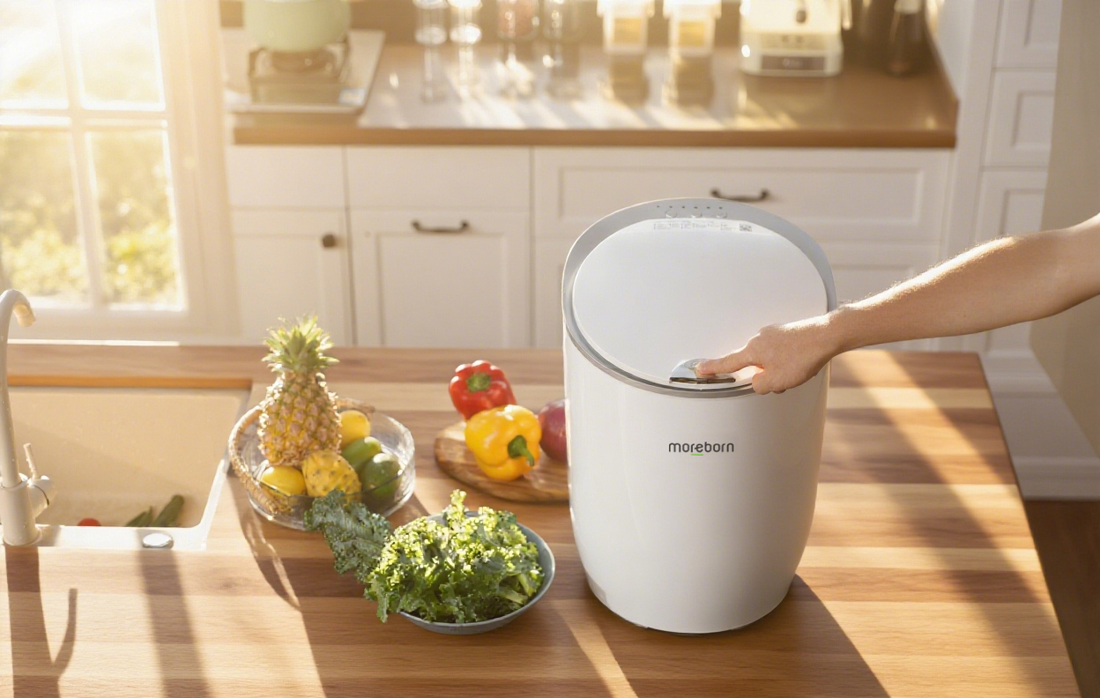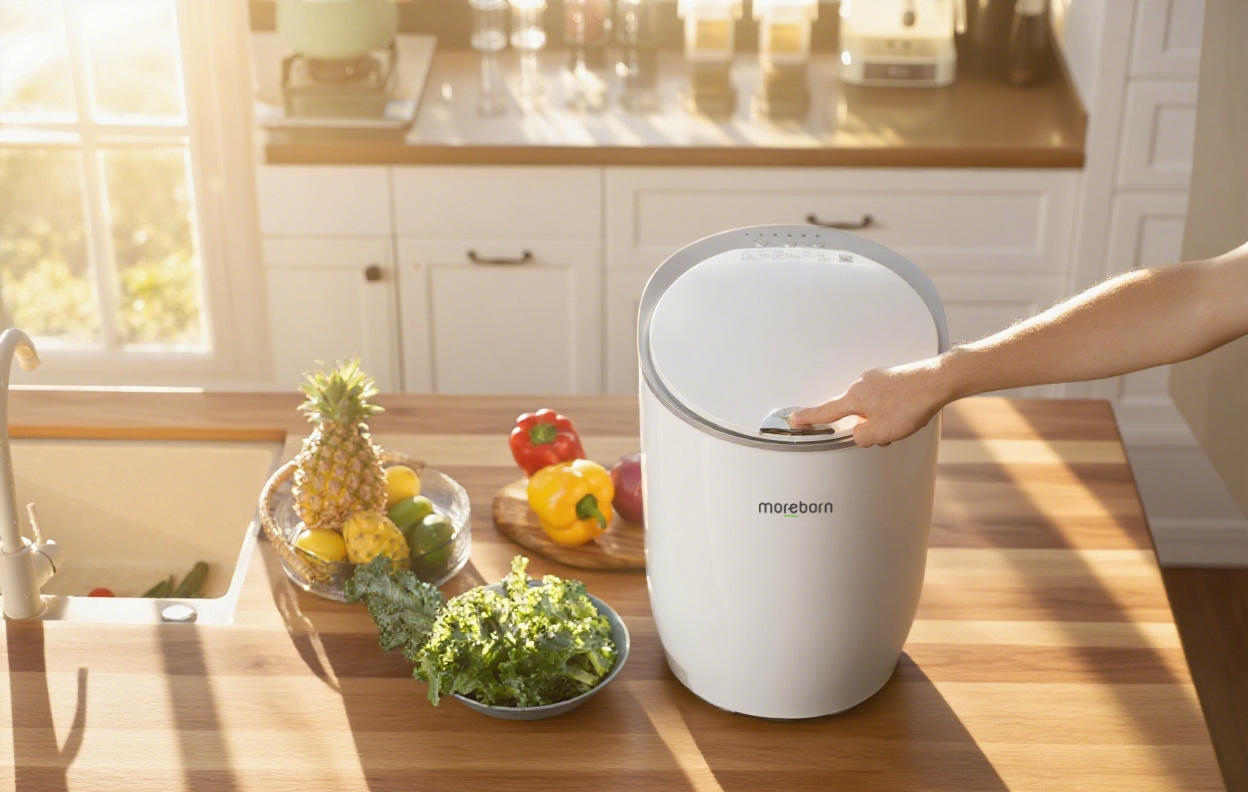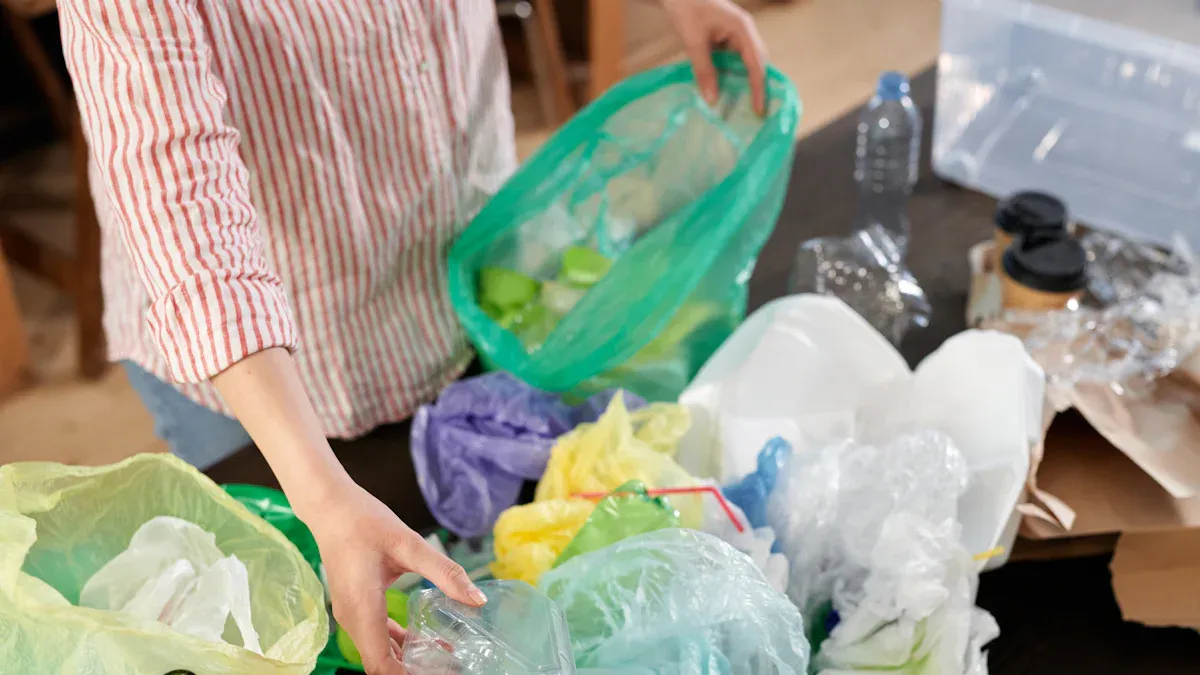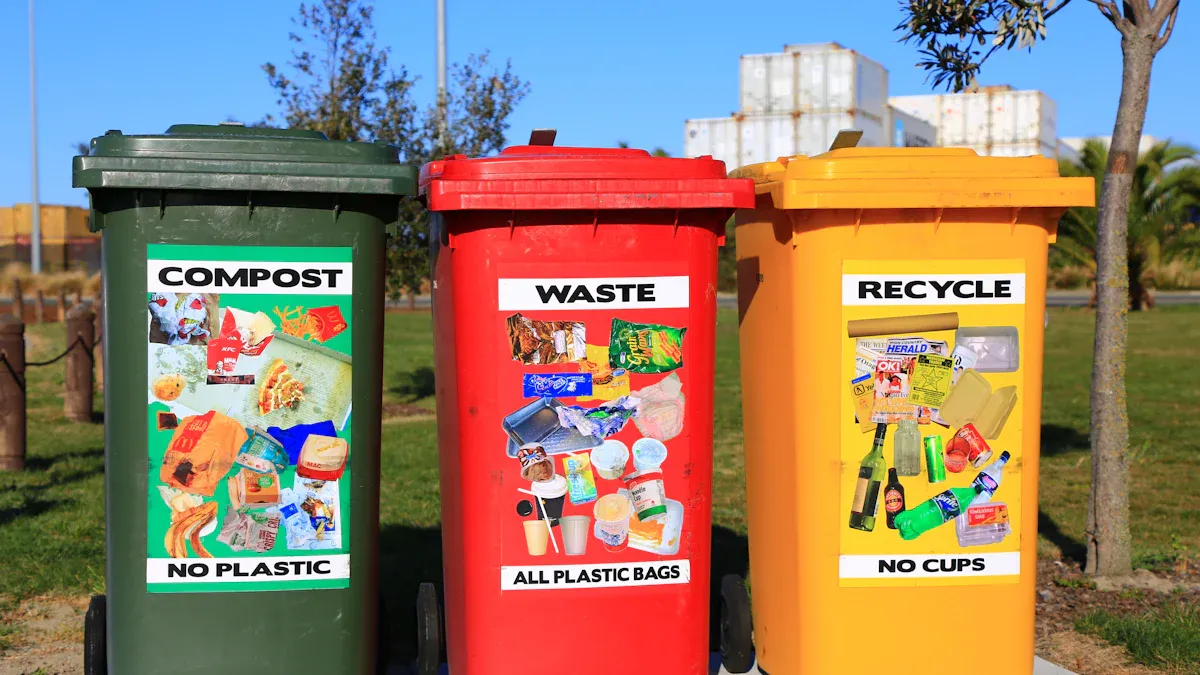
Natural Composting vs Electric Composters – Which Is Right for Your Home?
Share

If you live in an apartment, electric composters can help. They work fast and do not need much effort. The electric composter MB12 is one example. If you have outdoor space, natural composting may be better. It is good for people who care about the environment.
When you choose, think about these things:
Space and where you will put it
How to control smells
How strong it is and what it is made of
How easy it is to use and clean
If it is loud or looks nice
How much waste it can hold
How much it costs and if it is good for the planet
Your daily habits and care for the earth should help you decide.
Key Takeaways
-
Natural composting does not cost much money. It is good for the environment. But it takes a long time to finish. You need weeks or months. You also need outdoor space. You must take care of it often.
-
Electric composters work very fast. They can be used inside your home. They do not need much work from you. But they cost more money. They also use electricity.
-
Both ways help cut down food waste. They lower bad methane gas. They make good compost for your plants.
-
Pick the composting way that fits your space. Think about your time and how you live. This will make composting simple and useful.
-
Indoor composting like electric composters or worm bins are good for apartments. They help people keep their homes clean and green.
Comparison
Key Differences
There are some big differences between natural composting and electric composters. The table below shows how they are not the same in important ways:
|
Aspect |
Natural Composting |
Electric Composters |
|---|---|---|
|
Processing Time |
Works much faster, sometimes in just hours or days |
|
|
Required Space |
Needs outdoor space or a compost bin |
Fits indoors, takes up less space |
|
Environmental Impact |
Uses no electricity, makes compost rich in microbes |
Uses electricity, compost quality depends on the model |
|
Maintenance |
Needs you to turn and check the pile, no extra costs |
Needs less effort, some models need filter changes and cleaning |
Natural composting is best if you want healthy compost and can wait. You have to turn the pile and check if it is wet enough. You do not need to buy filters or pay for power. Electric composters are good if you want things done fast and easy. Some, like the Moreborn composter, use new technology to make real compost and do not need new filters. Other electric composters dry food waste and need new filters often, which costs more. If you want quick results and do not have much space, electric composters are helpful.
Tip: If you want less work and faster results, electric composters may fit your lifestyle. If you care most about the environment and compost quality, natural composting is a strong choice.
What’s Shared
Both natural composting and electric composters help you waste less food. You keep scraps out of the trash, so less methane gas goes into the air. Methane is a strong greenhouse gas. Composting at home helps the earth.
You also get something useful at the end. Both ways give you compost that helps plants grow. You can use it in your garden or for houseplants. Both choices help you make your home greener.
Environmental Impact

Methane & Emissions
Composting food scraps at home helps the earth a lot. In the US, about 24% of landfill trash is food waste. Landfills are the third biggest source of methane from people. Methane is a greenhouse gas much stronger than carbon dioxide. It can heat the planet 28 to 36 times more than CO2.
Here is what happens when you compost instead of using landfills:
-
You keep food out of landfills, so less methane forms.
-
Both natural composting and electric composters use air, so they make mostly CO2, not methane.
-
Composting puts nutrients back in the soil and helps plants grow.
-
You save water and help the climate stay strong.
Note: About 58% of landfill methane comes from food waste. Composting helps lower this pollution.
Composting does not make energy like some other ways, but it keeps nutrients in the ground. Landfills and burning trash take away these nutrients and make more pollution.
Energy Use
Natural composting does not use any electricity. You just need to turn the pile and keep it wet. This way has a very small carbon footprint.
Electric composters use power to work faster. Most use about 1 to 1.5 kWh each time, like a slow cooker. This adds some carbon, but the main good thing is stopping methane from landfills. For every pound of food you compost, you stop about 3.8 pounds of carbon emissions.
|
Method |
Energy Use |
Greenhouse Gas Impact |
|---|---|---|
|
Natural Composting |
None |
Low (mainly CO2, no methane) |
|
Electric Composters |
1–1.5 kWh/cycle |
Low (mainly CO2, no methane) |
|
Landfill |
None |
High (50% methane, 50% CO2) |
|
Incineration |
High |
Moderate (energy recovery, but less efficient) |
Anaerobic digestion is even better for the planet because it makes energy from waste. Still, both composting ways are better than landfills and burning trash for cutting greenhouse gases and keeping soil healthy.
Convenience

Maintenance
You want a composting method that matches your daily life. Natural composting needs more work from you. You have to turn the pile often. You must check if it is wet enough. You also need to watch for bad smells. This takes time and effort. If you like being outside, this can be fun. You might enjoy getting your hands dirty.
Electric composters are much easier to use. Most work by themselves. You just empty the bin and clean it sometimes. You may need to change filters too. Some, like the GEME, need even less care. You save time and do not work as hard. This helps if you are busy. But some electric composters can break or only take certain foods.
|
Electric Composter |
Natural Composting |
|
|---|---|---|
|
Maintenance |
Minimal, mostly automated |
Regular turning, hands-on |
|
Cleaning |
Occasional |
Not needed |
|
Reliability |
May need repairs |
Very reliable |
Odor & Indoor Use
Odor control is important, especially in apartments. Natural composting can smell bad if you do not manage it. You must mix green and brown materials. You also need to keep air in the pile. Bad smells can bring flies or mice.
Electric composters are good for indoor use. They have lids, filters, and systems to stop smells. You can keep one in your kitchen. You do not have to worry about odors. This makes them great for small homes or apartments.
Tip: If you want less smell and no pests, electric composters are a cleaner choice.
Space
Space matters when picking a composting method. Natural composting needs outdoor space for a pile or bin. You need a yard or garden to set it up. This works best for people with big yards.
Electric composters fit in small places. You can put one on a counter or under a sink. They are good for apartments, condos, or homes with little space. You do not need a garden to use them.
Speed
Natural Composting Time
Natural composting takes patience. You will wait several months before you get finished compost. The time depends on the method you use and how much you manage the pile. If you use the hot composting method, you can get compost faster, but you need to turn the pile often and keep it moist. Cold composting takes longer but needs less work.
Here is a table to help you see the differences:
|
Composting Method |
Typical Duration |
Key Points |
|---|---|---|
|
Traditional Natural |
Pile up scraps, wait for next planting season, slow breakdown |
|
|
Hot Composting (Berkeley) |
About 18 days |
Needs large pile, frequent turning, careful moisture control |
|
Cold Composting |
Up to a year |
Small piles, little turning, slowest process |
Tip: If you want compost quickly, try hot composting. If you do not mind waiting, cold composting works with less effort.
Electric Composters Speed
Electric composters work much faster than natural methods. Many models can process food scraps in just a few hours or days. For example, some machines finish a batch in 4 to 6 hours. Others, like the Reencle Prime、Moreborn MB12, let you add scraps any time and remove compost as needed. You will get a soil-like mix quickly, but it still needs about a week in soil to finish curing.
-
You can run most electric composters for 2–4 hours daily.
-
Some models need cleaning between batches, which adds a little time.
-
The output is almost ready to use, but letting it sit in soil for a week makes it better for plants.
Note: Electric composters give you fast results and fit busy lifestyles. You do not have to wait months for usable compost.
Cost
Upfront & Ongoing
When you choose a composting method, you should think about both the starting cost and the money you spend over time. Natural composting systems cost almost nothing to set up. You might use a simple pile in your yard or a basic bin. You do not need to buy special equipment. Most of your work comes from turning the pile and checking moisture. You do not pay for electricity or filters.
Electric composters cost more at the start. Most models range from $250 to $500. For example, the Lomi costs about $450~$700, and the Moreborn MB4 costs around $300~$400. You also need to clean the machine and sometimes replace filters. These tasks add small ongoing costs. Some machines need you to keep the right balance of microbes, which may mean extra care.
Here is a table to help you compare:
|
Composting System Type |
Average Upfront Cost |
Ongoing Maintenance Cost |
Notes |
|---|---|---|---|
|
Natural Composting Systems |
Almost free (minimal cost) |
Very low |
Slow process; no extra expenses. |
|
Electric Composters |
$250 - $500 |
Some maintenance needed |
Fast results; needs cleaning and sometimes filter changes. |
Tip: If you want to save money, natural composting is the cheapest choice. If you want speed and less work, electric composters offer convenience but cost more.
Compost Value
Both composting methods give you valuable finished compost. You can use this compost to feed your garden or houseplants. Here is what you get from each method:
-
Electric composters make compost that is dry, light, and full of nutrients. You can use it right away in pots or garden beds.
-
You can compost indoors all year, even in winter when outdoor piles slow down.
-
The finished compost helps tomatoes, herbs, and other plants grow strong.
-
You do not need to worry about bad smells or pests with electric composters.
-
Using your own compost saves you money on buying soil or fertilizer.
Natural composting also gives you rich compost, but it takes longer. Both methods help your plants and reduce waste. You can choose the one that fits your needs and budget.
Lifestyle Fit
Apartments
If you live in an apartment, you need a composting method that fits your space and keeps your home fresh. Many indoor options work well for small areas. Worm bins, also called vermicomposting, fit under sinks or in closets. These bins use special worms to break down food scraps. If you care for them, they do not smell and give you rich compost for plants. Countertop composters are another good choice. They sit on your kitchen counter and control odors well. You only need to empty them and clean them sometimes. Bokashi composting uses a special bucket and microbes. It works indoors with little smell, but you must finish the process outside or in another bin.
|
Composting Method |
Space Needed |
Odor Control |
Convenience |
|---|---|---|---|
|
Worm Bins |
Very small |
Good |
Needs care |
|
Countertop Composters |
Very small |
Excellent |
Very easy |
|
Bokashi |
Small |
Good |
Needs extra step |
Tip: Choose a method that matches your routine and space. Indoor composting keeps your apartment clean and green.
Gardeners
If you have a garden, you can use natural composting methods. Outdoor compost bins or piles work best when you have space. You can compost yard waste, leaves, and kitchen scraps. Turning the pile helps it break down faster. The finished compost feeds your soil and helps your plants grow strong. You can also try hot composting if you want faster results. This method needs more work but gives you compost in weeks.
Some gardeners use electric composters to speed up the process. These machines work indoors and give you compost quickly. You can add the output to your garden beds or mix it into your soil.
Note: Outdoor composting gives you large amounts of compost for your garden. Electric composters help if you want quick results or need to compost indoors during winter.
Busy Homes
If your home stays busy and you have little time, you need a composting method that saves effort. Electric composters work well for busy families. You just add food scraps, press a button, and let the machine do the work. These machines run quietly and control odors. You do not need to stir or check the pile. The process finishes in a few hours, so you get compost fast. You only need to clean the machine and change filters sometimes.
-
Plug-and-play design makes them easy to use.
-
They fit in kitchens or small spaces.
-
You can compost a wide range of food scraps.
-
No need to worry about pests or outdoor space.
If you want to compost but have little time, electric composters offer a simple and fast solution.
Pros and Cons
Natural Composting
Natural composting gives you many benefits for your home and garden:
-
You improve your soil by adding compost. This helps with drainage in clay soils and water retention in sandy soils.
-
Compost supports healthy plant growth by adding nutrients like nitrogen, phosphorus, and potassium.
-
You help the environment by keeping food waste out of landfills. This reduces methane, a strong greenhouse gas.
-
Composting at home saves you money. You buy less fertilizer and use fewer chemicals.
-
You support soil life. Compost brings helpful microbes and worms to your garden.
-
You lower your carbon footprint and help conserve land and water.
Tip: Composting is a rewarding way to join the green revolution and make your home more sustainable.
However, you may face some challenges:
-
You need space for a compost pile or bin. Small yards or apartments can make this hard.
-
Composting takes time and effort. You must turn the pile, check moisture, and balance materials.
-
Bad smells can happen if you do not manage the pile well.
-
Pests like flies or rodents may visit if you add the wrong scraps.
-
The process can take months or even a year, which may not fit a busy lifestyle.
Electric Composters
Electric composters offer a different set of advantages:
-
You can compost indoors, even if you live in an apartment or have no yard.
-
These machines work fast. You get usable material in hours or days, not months.
-
Most models control odors well, so your kitchen stays fresh.
-
You avoid pests because the process is enclosed.
-
You can compost year-round, no matter the weather.
-
Many machines handle a wide range of food scraps, including meat and dairy.
Still, there are some drawbacks:
-
Electric composters cost more to buy than a simple compost bin.
-
They use electricity, which can raise your energy bill and affect your environmental impact.
-
You need to clean and maintain the machine. Sometimes, you must replace parts or filters.
-
Most machines have a small capacity. If you have a lot of food waste, you may need to run them often.
Note: Electric composters make composting easy and quick, but you should consider the cost and upkeep.
There are different ways to compost at home. You should think about how much space you have. Also, think about how much time you can spend. Composting helps the earth by lowering methane and making soil better. But it needs some work and a place to put it. Electric composters are fast and easy to use. Natural composting costs less and is good for the soil.
|
Factor |
Why It Matters for You |
|---|---|
|
Space |
Small homes need compact solutions |
|
Time |
Busy lives benefit from quick methods |
|
Maintenance |
Choose what fits your routine |
|
Compost Use |
Pick a method that suits your plants |
Pick the composting way that fits your life. This will help you care for the planet and meet your green goals.
FAQ
What food scraps can you compost in each method?
You can compost fruit, vegetables, coffee grounds, and eggshells in both methods. Electric composters often handle meat and dairy. Natural composting works best with plant-based scraps. Always check your composter’s manual for a full list.
Do electric composters smell bad?
Most electric composters use filters and sealed lids. You will notice little to no odor. If you clean the machine and change filters as needed, your kitchen stays fresh.
How much electricity does an electric composter use?
Electric composters use about 1 to 1.5 kWh per cycle. This is similar to running a slow cooker for a few hours. You can check your model’s manual for exact numbers.
Can you use compost from electric composters right away?
You can use the output from electric composters as a soil booster. For best results, mix it with soil and let it cure for about a week. This helps plants grow better.
What should you do if your compost pile smells bad?
Tip: Add more dry materials like leaves or paper. Turn the pile to add air. Avoid adding meat, dairy, or oily foods. A balanced pile smells earthy, not rotten.

